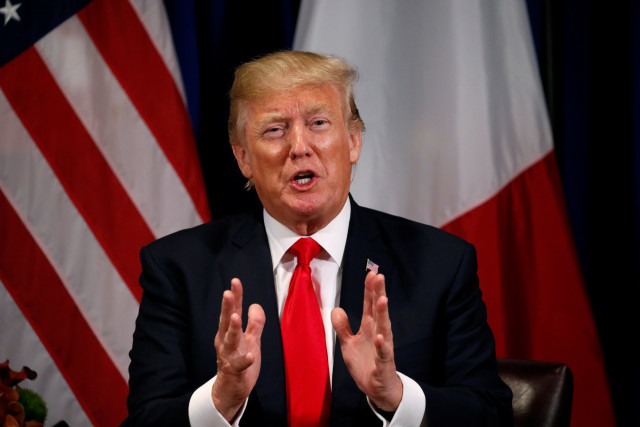Trump’s N Korean challenge: can Pakistan be next?
Trump has rebuked both South Korea and China for appeasement after the North Korean ICBM test

US President Donald Trump speaks during a meeting with French President Emmanuel Macron in New York. PHOTO: REUTERS
Trump has rebuked both South Korea and China for appeasement after the North Korean ICBM test. He has threatened China with sanctions for continuing trade with North Korea. Trump and his military advisers have threatened the use of massive military force like the world has never seen. This begs the question: will Trump break the nuclear taboo? Perhaps. But it does not matter whether North Korea or the US would be the first to attack. Once the nuclear taboo is broken, which has been in place for the last 72 years, it will legitimise the use of nuclear weapons for teaching an adversary a lesson or to ensure its compliance. Thus, it will make annihilation acceptable as a possible concept.
Looking at the Trumpian approach, one can posit a question — what will Trump consider as the next challenge. Can it be Pakistan? Perhaps if the US sees North Korea and Pakistan as China’s proxies.
Pakistan and North Korea are of course two completely different cases. In contrast to Pyongyang, Islamabad does not have ICBMs, thermonuclear weapons or whatsoever that can deter the US. Nevertheless, is it unthinkable that one day Pakistan could be on the list? No. Can Pakistan’s nuclear weapons save it from a US conventional or nuclear attack? No. So should Pakistan be worried? Yes. For Trump and his national security community, nuclear war is both thinkable and winnable. Trigger-happy Trump might use post-North Korea scenario as a benchmark to signal the rest of the world that under his leadership, the US can go to any extent to ensure compliance and the presence of nuclear weapons in a country will not stop him. Dangerous? Certainly. Would it have consequences? Surely. Still thinkable? Possibly.
After President Trump unveiled his South Asia strategy, the US Ambassador to Pakistan, David Hale met Pakistan’s Chief of the Army Staff, General Gen Qamar Bajwa. During the meeting, Gen Bajwa stated that Pakistan did not need aid but an acknowledgement of its sacrifices and critical role in the war on terror. This is not the first time someone from Pakistan has told the US that they do not need its financial assistance. General Zia in 1980 while rejecting Carter’s initial $400m aid offer told the then assistant to President Carter for national security affairs, Zbigniew Brzezinski, and the deputy secretary of state, Warren Christopher, that Pakistan did not need US military and economic assistance if the US could not provide security guarantees to it against these three contingencies: a) Soviet attack on Pakistan b) Soviet-Indian collusion in an attack on Pakistan and c) situation in which the Soviets encouraged an Indian attack on Pakistan. Zbigniew and Christopher were puzzled for they could not understand Pakistan’s insecurity and obsession with India. They were surprised that Zia was willing to let go of military and economic assistance in lieu of a simpler security guarantee against India in addition to the Soviets. In the decades that it took Pakistan to develop nuclear weapons, several US administrations ridiculed the notion that India posed a threat to Pakistan (existential or otherwise) thereby undermining the rationale for Pakistan’s need for nuclear weapons. But look what happened. Pakistan became a nuclear weapon state under a sanctions regime in the absence of security guarantees from the US.
Today, one is reminded of Kissinger’s dictum, “a nation’s security is more important to that country than it is to the United States.” But despite that Kissinger was approached during the run-up to Trump’s presidency, it seems that now no one in the current US administration is listening. By inviting India to play a role in Afghanistan’s development, the US has once again repeated the grave mistake of misunderstanding Pakistan’s security concerns with regard to India. If and when Indian boots hit the ground in Afghanistan, even if in token representation to join the coalition, Pakistan will have to be prepared for dual attack contingencies. We need to strategise against the possibilities of any misadventures in any territory in Pakistani control. This, points at the need to retaliate and defend ourselves against any raid, cross-border sweeps or search-and-destroy missions by any adversary. The need to modernise Pakistan’s conventional forces and strengthen non-nuclear deterrence is relevant more than ever before. We must also now think of ways to deter the Trump-led US. Tactful diplomacy should be an obvious start but we must think and prepare for the unthinkable.
Published in The Express Tribune, September 20th, 2017.
Like Opinion & Editorial on Facebook, follow @ETOpEd on Twitter to receive all updates on all our daily pieces.















COMMENTS
Comments are moderated and generally will be posted if they are on-topic and not abusive.
For more information, please see our Comments FAQ